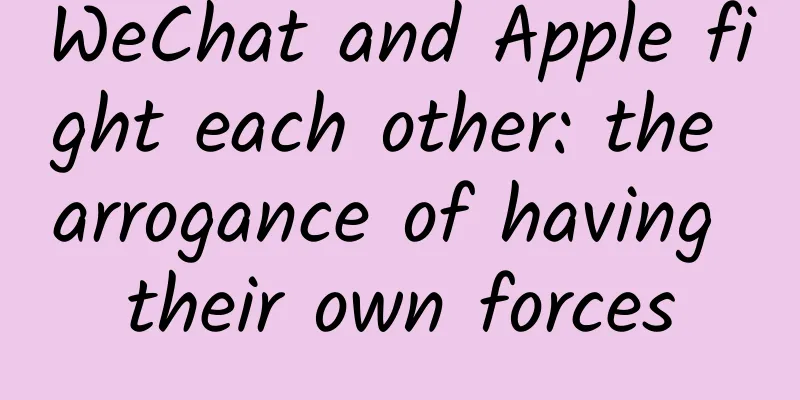WeChat and Apple fight each other: the arrogance of having their own forces

|
A fierce battle broke out between WeChat and Apple. First, I was told that the reward function was no longer available, then the QR code transfer function was no longer available, and then the transfer function was no longer available. There have been many articles online analyzing the right and wrong of this matter. Some people see it as a dispute over interests, with Apple wanting to get a piece of the pie; some people see it as a game for discourse power; some people speak for Apple, while others speak up for WeChat. We, who have spent a lot of money to buy Apple phones and are loyal users of WeChat every day, are the ones who actually pay for this fight, but we have become spectators and bystanders, and can only complain a few words online. The fight between WeChat and Apple seems to have nothing to do with the public. In the past, we could only experience this kind of terrible situation in monopoly industries, but it actually happened in a very competitive market, in the current era of interconnection. You can't decide what to do with the phone you bought. You need others' consent to use it. You can turn it off or stop it whenever you want. Consumers don't even have the basic right to choose. Are they buying a phone or a pair of shackles? Both Apple and WeChat are very strong, and both are willing to give up, but where do they get their confidence from? If Apple did not have a huge user base and these users did not prefer the iOS system, it would just be a simple mobile phone manufacturer. How could it have the power to decide what kind of software should be put on the shelves and what kind of software should be removed? Similarly, if WeChat did not have hundreds of millions of users and a near-dominant position in the field of social software, would it dare to shut down so easily? Of course, users have another choice, which is not to use it. The problem is that it is not so easy to change the usage habits formed over the years. It is not difficult to switch from an Apple phone to an Android phone. If you don’t use WeChat, what should you use? Do the public have a second choice? Where should so many self-media and public accounts be moved? Should you replace the entire phone just because of this inconvenience? This right of choice is, to some extent, fictitious. So, although it seems that both sides are communicating with each other and speaking in a civilized manner, what supports this calm is the arrogance of having their own military power. A few years ago, Tencent and the antivirus software 360 had a similar dispute. Users suddenly found that their computers no longer obeyed them and they could not use QQ with 360. This made users realize for the first time that so-called rights are so fragile. The dispute between Tencent and 360 was too blatant and caused a great backlash from society, so it was eventually dropped. However, today's dispute seems to have much more valid reasons. I have the final say on my own territory, I developed the software, and I have the right to interpret it, but is it really that simple? Do developers have monopoly and exclusivity? Then wouldn't those companies that control platform resources and high-end manufacturing industries be able to charge exorbitant prices? Installing apps on an Apple phone requires Apple's consent and must be downloaded from Apple's App Store. Can we imagine buying a Lenovo computer and installing software or something and needing Lenovo's consent? What is the difference between the two? When a platform has a large user base, it has the attributes of a public platform, and there will be a dispute over public interests. The role of enterprises will also change accordingly, and they will have the function of public management. Naturally, enterprises cannot simply decide how to manage. In addition, although the traces of the public's Internet life, including personal accounts, are personal, they are all made up of various platforms. So does the property belong to the person himself or to the platform? Can the platform ban or stop it at will? How can the interests of the public be protected? The fight between Apple and WeChat shows that resource-based industries controlled by state-owned enterprises have monopolies, and the Internet industry, where private capital is concentrated, also has the possibility of abusing market positions. Both are mobile phone operating systems, but closed Apple always talks to itself, while open Android has never heard of these problems? It is conceivable that if there were no Android system, what would the current smartphone market look like? The significance of the Internet's progress lies in interconnection and interoperability. Interconnection and open sharing have promoted the leading position of Chinese Internet companies in the world. However, with the emergence and competition of giants, there is a tendency to self-enclose. Factions are everywhere, and each mountain is self-contained. Each faction is independent and mutually exclusive. In some local areas, because resources are too concentrated, platforms are not open to the outside world, and even monopolies are formed, which constitutes an infringement of the public interest. Articles are deleted and accounts are blocked. Society needs to bring this kind of interest dispute into a standardized channel, and also needs to use the law to restrict the abuse of market position. Internet companies help promote social progress. There is an essential difference between closed and open. Closed brings huge profits to individual companies, while openness will prosper the entire market. It is still necessary to evolve from the competition for land enclosure to the competition for services, return to the competition for service quality, and return to the purpose of openness and interoperability. As a winner of Toutiao's Qingyun Plan and Baijiahao's Bai+ Plan, the 2019 Baidu Digital Author of the Year, the Baijiahao's Most Popular Author in the Technology Field, the 2019 Sogou Technology and Culture Author, and the 2021 Baijiahao Quarterly Influential Creator, he has won many awards, including the 2013 Sohu Best Industry Media Person, the 2015 China New Media Entrepreneurship Competition Beijing Third Place, the 2015 Guangmang Experience Award, the 2015 China New Media Entrepreneurship Competition Finals Third Place, and the 2018 Baidu Dynamic Annual Powerful Celebrity. |
<<: I hope this fun and inexpensive sports car can enter the Chinese market in the future
>>: Performance is close to Golf R. New generation Hyundai Veloster is about to debut
Recommend
Sony SP700N noise-cancelling sports beans review: No one around except the natural sound
Sony's efforts in noise-canceling earbuds are...
Free APP promotion, what strategies do startups need!
In this era of mass entrepreneurship , there are ...
Huawei is determined to enter the notebook industry: Who is the target of MateBook?
The Barcelona Mobile World Congress (2016 MWC) wi...
Activity Operation丨How to Play APP Online Activities and Offline Promotion
Today, I will summarize some methods of online ac...
Excel Workplace Secrets Excel Course from Novice to Expert
Course Catalog: 01 The correct way to use Excel.a...
Celebrity X-Files: Alan Turing | Celebrating Turing's 110th Birthday
Alan Turing, a British computer scientist, mathem...
They may have forgotten all the formulas, but they know how to learn mathematics best.
How to learn mathematics? Professor Ding Jiu of t...
By mastering these points, you can also plan an event that will sweep your circle of friends!
All of you in the Internet industry should be awa...
A Beginner's Guide to User Growth!
The scope of growth is very large. This article f...
Is this the "King of Vitamin C" among vegetables? Debunking 6 Myths About Eating Spicy Foods
Key Points ★ Peppers are excellent in vitamin C c...
In 10 minutes, you can realize global prompt of network status changes in APP
Never expect users to follow your pre-set steps t...
China Automobile Dealers Association: Auto dealer inventory warning index is 52.5% in October 2021
On October 31, 2021, the latest issue of the &quo...
I suddenly felt dizzy, but it was gone in a few seconds. What happened? Huaxi doctor: The reason may be the ear...
Have you ever experienced I got up from the bed a...
American TV series "Bones" all 12 seasons 246 episodes HD English subtitles collection
"Bones" is a forensic crime drama serie...









